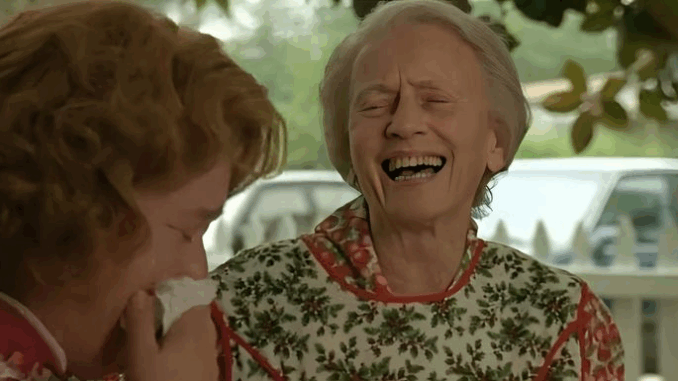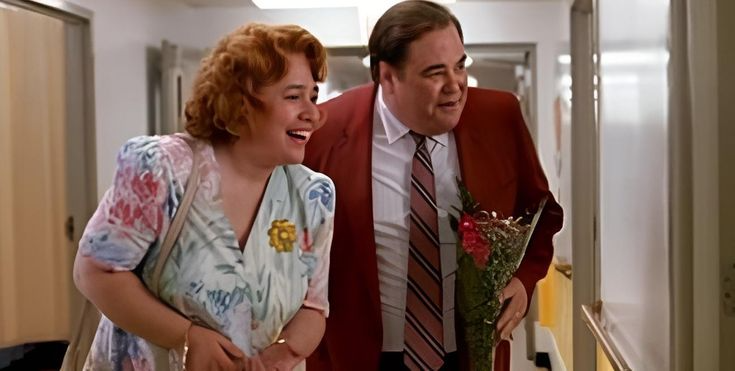
Fried Green Tomatoes (1991) is a film that masterfully blends past and present, weaving together two storylines that reflect the lives and transformations of its central characters. The film’s seamless narrative technique and the intermingling of memories from the past with the realities of the present offer a compelling exploration of self-discovery, healing, and transformation. The connection between past and present in the film is not merely about nostalgia or reminiscence; it’s a dynamic force that shapes the lives of its characters, driving them to question their identities, uncover hidden truths, and ultimately find peace.
The Role of Memory: A Bridge Between Time
One of the most striking aspects of Fried Green Tomatoes is how it uses memory as a vehicle to connect the past and present. Ninny Threadgoode, an elderly woman living in a nursing home, shares stories from her past with Evelyn Couch, a discontented housewife struggling with her own sense of identity. As Ninny recounts tales of Whistle Stop and the people who lived there — particularly Idgie Threadgoode and Ruth Jamison — the audience is transported to a time long gone. These flashbacks are more than just recollections; they are the catalysts that drive Evelyn’s transformation.
Through Ninny’s stories, we learn about the complex relationships and emotional journeys of the characters in Whistle Stop. Their struggles, resilience, and love for each other serve as a mirror for Evelyn, who begins to reflect on her own life choices. The more Evelyn listens to Ninny’s stories, the more she begins to understand herself and gain insight into the discontent that has plagued her life.
Ninny’s recounting of the past offers wisdom and clarity to Evelyn, but it also serves as a powerful reminder that the past is never truly gone. It lives on in the stories we tell, in the people we love, and in the choices we make. In this way, Fried Green Tomatoes demonstrates how the past shapes the present and how the present offers opportunities to reframe and redefine the past.

Self-Discovery Through Connection: Evelyn’s Journey
Evelyn’s journey of self-discovery is deeply intertwined with her connection to Ninny and the stories she hears about the women in Whistle Stop. At the beginning of the film, Evelyn is a middle-aged, dissatisfied housewife who feels invisible and unimportant. Her life is defined by routine, and she has little sense of personal agency. However, as she listens to Ninny’s stories, Evelyn is drawn into the world of Whistle Stop and finds herself relating to the women there in ways she never expected.
The stories of Idgie and Ruth resonate deeply with Evelyn, and she begins to see reflections of herself in their experiences. Like Ruth, she feels trapped in a life that doesn’t align with her true desires. Like Idgie, she longs for independence and strength. Ninny’s recounting of these women’s courage and resilience inspires Evelyn to find her own strength and voice.
What begins as a passive listening experience for Evelyn soon transforms into a profound exploration of her own life. She starts to make changes, both in her relationship with her husband, Frank, and in how she views herself. Her newfound understanding of the past — and how it connects to the present — allows her to take control of her future. In this way, the past serves as both a mirror and a map, guiding Evelyn as she embarks on her own journey of personal growth.
The Influence of the Past on Ruth and Idgie
The film also explores how the characters’ pasts directly influence their decisions and actions. For Ruth and Idgie, the past is both a source of pain and a foundation for their strength. Ruth’s past is marked by abuse and the emotional scars of her marriage, while Idgie’s past is shaped by the loss of her brother and her experience of being an outcast in society. Despite these hardships, their relationship with each other becomes a powerful force for healing and empowerment.
For Ruth, the memories of her traumatic past are difficult to escape. She is constantly haunted by the way she was treated by her husband and society. However, her bond with Idgie allows her to confront these demons. Idgie’s love and loyalty give Ruth the courage to escape her abusive marriage and forge a new life for herself. This act of liberation is not only a physical escape but also a psychological and emotional rebirth for Ruth, who learns to trust again and embrace her own strength.
Idgie, on the other hand, has a complicated relationship with the past. She is fiercely protective of Ruth and deeply loyal to her. But Idgie’s past is marked by trauma — the death of her brother, the pain of losing her family, and the rejection she faced from the community. Despite these experiences, Idgie’s refusal to conform to societal expectations and her creation of a family with Ruth and the other women in Whistle Stop symbolize the power of overcoming the past and living on one’s own terms.
In this way, both Ruth and Idgie demonstrate how the past does not have to define a person’s future. They acknowledge their history but refuse to let it control their lives, choosing instead to build a future that is based on love, acceptance, and strength.
The Past as a Guide: Ninny and Evelyn’s Shared Wisdom
While much of the film focuses on the past lives of Idgie and Ruth, Evelyn and Ninny also exemplify how the past can be a guide to self-discovery and healing in the present. Ninny’s stories are not just about nostalgia; they serve as lessons for Evelyn, teaching her about resilience, love, and self-worth. Ninny’s experiences and the way she relives her memories allow Evelyn to reclaim her own power.
Ninny, despite her old age and the limitations of living in a nursing home, remains a figure of wisdom and strength. Her ability to share the stories of the past with Evelyn — not just as a narrative but as a source of life lessons — is a reminder that the past, with all its suffering and triumph, is never truly gone. It continues to influence and shape the lives of those who are willing to listen and learn.
Evelyn’s transformation is a reflection of how the past can be integrated into the present in meaningful ways. By embracing the stories of Whistle Stop and the courage of its characters, Evelyn is able to find the strength to confront her own life’s challenges. The past, for Evelyn, becomes a source of wisdom and empowerment, helping her break free from the limitations she has placed on herself.
Conclusion: Reconciliation Between Past and Present
Fried Green Tomatoes offers a powerful meditation on the connection between past and present and how the two influence our personal journeys of self-discovery. Through the lens of the characters’ experiences, the film reveals that the past is never truly gone; it lives on in the stories we tell, the relationships we form, and the decisions we make.
For Evelyn, Ninny, Idgie, and Ruth, the journey of self-discovery is not just about moving forward, but also about understanding and reconciling with the past. The film suggests that healing is not about forgetting the past, but about integrating it into the present in a way that empowers us to live more fully.
Ultimately, Fried Green Tomatoes shows that the connection between past and present is not just a reflection of time but a source of transformation. It is through this connection that the characters find their true selves, reclaim their agency, and create lives full of meaning, strength, and love.
